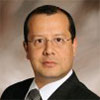The Mid-Year Forum and Congressional Advocacy Day allow you to understand and witness first-hand the dynamic interaction between ophthalmologists, their societies, the Academy and the legislators on Capitol Hill. It is also a great place to acquire leadership skills by some of the best mentors in our field. But I didn’t know how much you could learn in just three days!
1. You’re never too young to advocate. During Congressional Advocacy Day on April 14, I got the opportunity to meet and discuss important issues with my state senators and representatives. They were very attentive to what we wanted to discuss.
I was fortunate to have a team of greatly experienced people in my meetings, but the legislators and their staff always appreciated the input of the members in training as they perceive us as less tainted than the more-seasoned ophthalmology leaders.
2. Leadership takes passion and resilience. During the L.E.A.P. (Leadership, Engagement, Advocacy and Practice management) Forward program, Tamara Fountain, MD, Academy secretary for member services, discussed how to become an effective leader. She emphasized example and service, but also stressed that you need to have passion that drives you towards your goal.
Washington Post Editor Bob Woodward, the Mid-Year Forum keynote speaker, also discussed leadership in a talk about U.S. presidents. He noted that they face hard decisions every day; sometimes they make good choices and sometimes they don’t. But as Jeff Pettey, MD, said during the L.E.A.P. Forward seminar, “Leadership is not about not failing – because you will fail – but rather how you bounce back from failure.”
3. The early worm shakes the president’s hand. During his L.E.A.P. Forward presentation, Ravi Goel, MD, discussed why you should stay engaged. The highlight was his story about a trip when he was determined to meet President Barack Obama. Because he and fellow ophthalmologist Robert Melendez, MD, showed up at an event even before the Secret Service, they went home with a picture of themselves shaking hands with President Obama.
4. You never know how your relationships will help patients. Sidney Gicheru, MD, past president of the Texas Ophthalmological Association, shared how relationships forged through state advocacy helped him solve a customs problem during an international medical mission. While on a trip to Haiti with other doctors, Dr. Gicheru’s group had all their equipment held at customs.
The officials wanted a bribe and were determined to ruin the hope of cataract surgery for many patients in need. But because of his past efforts in advocacy in his home state and the relationship he had developed with his legislators, Dr. Gicheru’s call was rapidly escalated to the U.S. embassy in Haiti. Customs released their equipment, and the trip went on as planned.
5. Establish a practice where patients want to come back. Academy Past President Paul Sternberg, MD, gave some great pearls on establishing strong patient relationships. He suggested starting every morning by going to your waiting room to greet your patients and giving them your cell phone number and email address. He also stressed the importance of projecting honesty and openness: “Do not sneak through the back door and act as if you have something to hide.”
Even if you couldn’t attend this year’s Mid-Year Forum, you can still use their advice in your own career. Do you want to just stay on the sideline waiting for the inevitable to come? Or do you want to be part of the team who actually decides what happens to the future of ophthalmology and the eye care that our patients receive?
Let’s be leaders and be good leaders. Through events like the Mid-Year Forum and countless other tools, the Academy and the YO Committee give us all the tools we need to lead.
* * *
 About the author: Juan P. Fernandez de Castro, MD, has completed ocular pathology and molecular ophthalmology fellowships at the University of Iowa and a postdoctoral research fellowship in stem cell biology and transplantation at the University of Louisville. After an internship in general surgery at the University of Louisville, he is now a PGY3 at the university’s department of ophthalmology and visual sciences. The Kentucky Academy of Eye Physicians and Surgeons sponsored his Mid-Year Forum 2016 attendance through the Advocacy Ambassador Program.
About the author: Juan P. Fernandez de Castro, MD, has completed ocular pathology and molecular ophthalmology fellowships at the University of Iowa and a postdoctoral research fellowship in stem cell biology and transplantation at the University of Louisville. After an internship in general surgery at the University of Louisville, he is now a PGY3 at the university’s department of ophthalmology and visual sciences. The Kentucky Academy of Eye Physicians and Surgeons sponsored his Mid-Year Forum 2016 attendance through the Advocacy Ambassador Program.